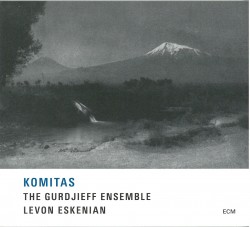 Komitas
Komitas
Gurdjieff Ensemble; Levon Eskenian
ECM New Series ECM 2451
Komitas’ name is familiar to many local music-lovers, thanks to Isabel Bayrakdarian’s performances and CD of his songs. Soghomon Soghomonian (1869-1935), considered the founder of Armenian musical nationalism, took the religious name of Komitas upon his ordination as a priest in 1895. The priest-musician not only composed original works, but transcribed some 3,000 folk tunes, arranging many for piano, often indicating the folk instrument to be imitated by the pianist, such as the plucked-string tar, the double-reed zurna and duduk, and the tmbuk drum. These annotations assisted Levon Eskenian, director of the Gurdjieff Ensemble, when arranging some of Komitas’ folk-derived pieces for his ten-member folk-instrument group. These, then, are arrangements of arrangements, rather than any original Komitas compositions.
This is a disc to be dipped into, rather than listened to all at once, as most of the 18 tracks, like most of Komitas’ songs, are slow and sad. Only three up-tempo pieces interrupt the melancholy: the raucous Mankakan Nvag XII for reeds and drum; Lorva Gutanerg, a pogh (flute) solo; and Hoy, Nazan, a very pretty, gently flowing pogh-kanon (zither) duet. By far the longest track, over 11 minutes, is Msho Shoror, processional dance music for a traditional religious pilgrimage, now stately, now mournful, with the keening wails of zurnas and duduks, and the haunting sound of the pogh.
While more up-tempo pieces would have been welcome, this CD’s beautiful melodies and vivid, piquant instrumental timbres deliver genuine listening pleasure.



